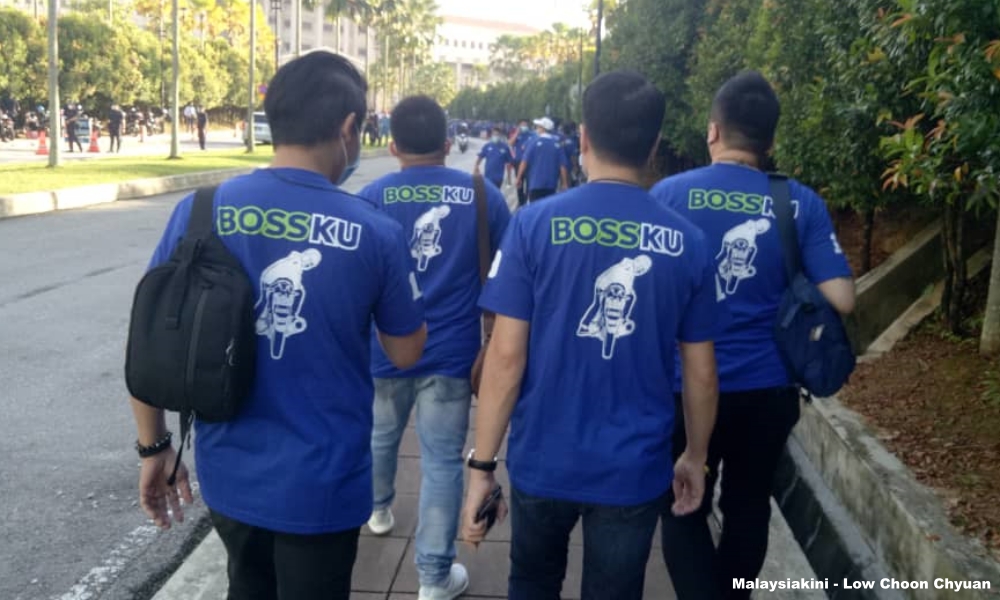In the rural heartland of Johor, having a ‘kenduri’ (communal feast) is usually the buzz of the town.
Since Covid-19 hit and mass gatherings were banned, from the shanties where men in ‘kopiah’, sarung and grey beard sit to chit-chat to hip food courts where ‘teh tarik’ is served in a beer tower, the biggest party in town is “Bossku”.
Many of the urban, progressive middle-class cannot fathom how a convicted felon is loved, cheered and adored everywhere he goes.
Call it absurd, folly or farce but for the ‘marhaen’ (common people) this time; race, creed or religion did not matter. What was perceived was that this man is generous, and that is fine even though he has been deemed to plunder the nation's coffers.
The Chinese came out in droves to the oldest temple in Johor Bahru. On social media, Indians were seen pouring milk from the top of a 20-feet banner of Najib Abdul Razak, which is an act of veneration in Hinduism.

At Felda settlements, Najib dined with the generations of settlers, who welcomed him with open arms.
The former prime minister was labelled as shameless by Damansara MP Tony Pua. Perikatan Nasional chairperson Muhyiddin Yassin took a swipe at Najib’s visit to Pagoh, which is his parliamentary constituency, by jokingly asking his constituents to be wary of a robber.
I spent four days in Johor recently and visited eight different constituencies to get a feel on the ground.
After these trips to the constituencies of Perling, Paloh, Tangkak, Senai and a few others, speaking to some of the locals, I have come to the conclusion that it is a sentiment of nostalgia, regret and guilt that is the bastion of the “Bossku” phenomena.
“Last time, ‘kena hasut’ (it was incited) by the Pakatan people that Najib has emptied our national coffers. But look at us today, we are not bankrupt. Najib ‘kena fitnah’ (was slandered).
“The Pakatan government did not make our lives better. They didn’t deliver their promises. How can you expect me to believe them?” said a woman in her 50s.
In another constituency, a man in a faded bandana and sunglasses with a cigarette in his hand told me:
“We were made to believe that Najib stole billions from the rakyat. But that is not true. When there is a funeral, he comes, when there is a ‘kenduri kahwin’ (wedding), he’s there. When he was prime minister, the economy was good.”
The origin of Bossku
Some even said they have no issues with the RM1.1 billion worth of luxury goods that were seized by authorities as part of the 1MDB investigation in 2018 because they believed it belonged to Najib’s wife, and not the man in question.
It certainly would be Greek to them if a Court of Appeal judge tried to explain how the bench came to a judgment from the convoluted 1MDB case, or that every country’s economy slumped during the pandemic.
All that these ‘marhaen’ seem to remember was the good old times of Najib’s leadership and how they were made to believe that the Pakatan Harapan government would build a better Malaysia - and it didn't.
Many think that the “Bossku” moniker was self-proclaimed by Najib, but it originated from a young man in Ipoh.
“Malu apa” was an existing slang that was used to imply that it does not matter how much money there is in the wallet, as long as the money earned was “halal” (legitimate).
When Najib appeared at this man’s humble shop, this man told Najib he wanted to make a viral video of his products on Facebook and he addressed Najib as “boss kita”.

Najib immediately replied to him: “Malu apa bossku”, because he was referring to the rakyat as his boss.
As true as Najib believes he is innocent, the byword stuck with him, the video went viral and his new campaign slogan was born.
The ‘marhaen’ were elated with the new tagline. Merchandise was produced and sold. A song was written. People were proudly adorning the “Malu apa bossku” prints on vehicles and clothes.
All publicity is good publicity
At almost all ceramahs by Harapan or Perikatan Nasional, Najib is mentioned. In fact, Najib makes the headlines every other day either due to court cases or political bickering.
As a communications specialist, there is no such thing as bad public relations. Negative perceptions fade more quickly than general awareness. Constant whiffs of negative publicity would only increase the popularity of a brand or person, which in this case is both.
The constant messaging adopted by Harapan and the other parties contesting in the Johor elections is to instil fear that Najib will return as prime minister if BN is voted back into power.
Najib has only said that he wanted to clear his name in court. He also took a ‘sumpah laknat’, an oath made by a Muslim to God asking for divine retribution if the individual is lying, that he did no wrong on the charges he was convicted for.
With the massive support Najib was given in Johor, would it not have been better to diversify the messaging among the Harapan and Perikatan Nasional component parties?
Has it been forgotten that Umno president Ahmad Zahid Hamidi and former Sabah chief minister Musa Aman, both combined have more than 80 charges of corruption, CBT (criminal breach of trust) and money laundering?
Or that the dust has settled on the recent case of MACC chief commissioner Azam Baki, whose brother “used his account” to purchase shares?
It is true that negative news always makes the headlines, but be mindful of Oscar Wilde’s famous quote: “The only thing worse than being talked about is not being talked about.” - Mkini
CHRISTINE YP is a former journalist working on development programmes.
The views expressed here are those of the author/contributor and do not necessarily represent the views of MMKtT.




No comments:
Post a Comment
Note: Only a member of this blog may post a comment.